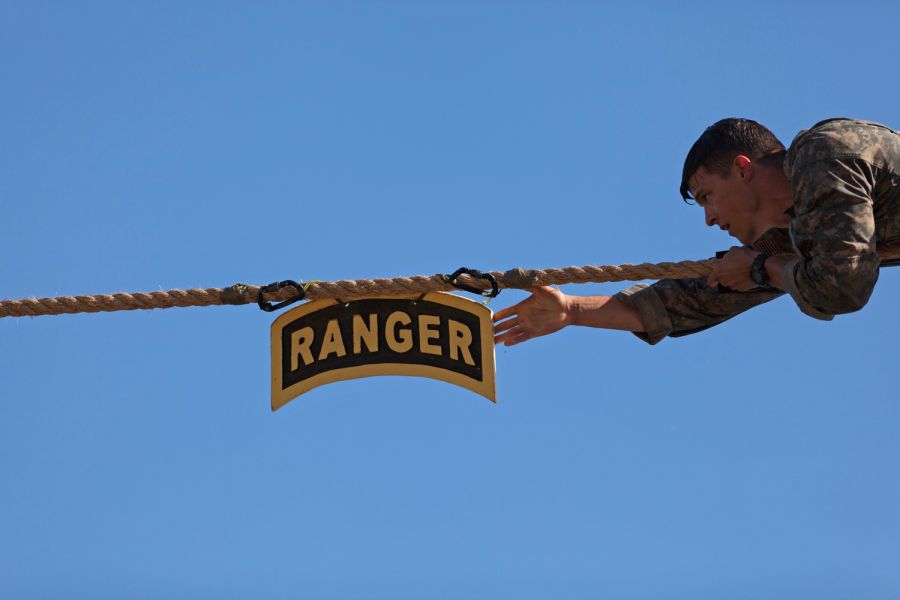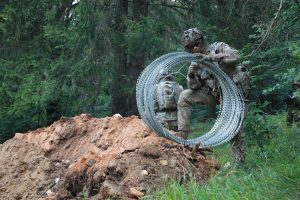Why Ranger-Qualified 2LTs and SPCs are Hated

It was August of 2015, and it was time to submit my accessions packet. The Executive Officer of the ROTC Battalion where I attended school looked at me and profoundly stated: “So you understand the course of your career will be determined by if you make it through Ranger School?” This prerogative, success in the Infantry, was somehow determined by 62 days? I do not think that I fully grasped what he was attempting to portray, but I had never considered any other branch, so this one conversation was not going to sway my decision.
Fast forward to October of 2016. I was four days away from graduation from the Infantry Basic Officer Leader’s Course and my Platoon Trainer pulled me aside. He explained the importance of getting the coveted tab and told me not to come back and see him until I had earned it. He shook my hand and gave me a 3” piece of black and gold cloth, a “drive-on” tab.
As a young Lieutenant, it was ingrained in me that the only thing that mattered in the Army was getting a Ranger Tab. My only interactions with Officers at IBOLC were with ones who were Ranger-qualified. It was the expectation, and our training was tailored towards becoming a Ranger-qualified Officer. If I had a dollar for every time a Cadre mentioned Ranger School, well, I would have an enormous sum of money. It was generally the first thing I thought of when I woke up for PT, and the last thing I thought of when my head hit the pillow. It was understood that if you wanted to succeed in the Infantry, the Army, or at life for that matter, having a Ranger Tab was a necessity. Five days after IBOLC graduation, my quest began.
“You either have a tab, or a story.” On the 27th of January in 2017, I had the former. Fortunately for me, according to the Cadre at IBOLC, I still had a chance at succeeding in the Army and in life. For nearly two years, I had my sights set on this school, this moment, and just like that, it was in the rearview mirror.
I cannot pretend that Ranger School did not teach me many lessons, the majority of them in regards to myself. However, I may have learned more in the few months following the completion of the school. Of course, I will never forget the moment my wife pinned on that black and gold tab, but maybe even more memorable was the first time I stepped out in uniform donning the tab on my duty uniform. As I strutted out to my McLaren that morning, I thought I was 6’4”, 220lbs and could probably bench press 400lbs. In all actuality, I was overweight at 5’11”, would struggle with 30 pushups, and limped out to my 2007 Camry. Nonetheless, I had made it. I was the big man on campus. God forbid some POG or non-tabbed LT give me a look on the way to my first formation since graduation or I would rev my 4-cylinder and speed right past them with my left sleeve, in plain view, hanging out the window, for all to see.
It is difficult to explain, but after it has been preached that a Ranger Tab matters that much, it can make a lasting impression on the brain of a young Soldier, and it sure did for me. As I strutted through Airborne school over the course of the next three weeks, I was looked at in a way that I never had been before, and it continued to feed my hungry ego. After being treated the way you are while in Ranger School, you make it up with the expectation of how you feel the rest of the Army ought to treat you afterward. Everyone wanted to know what it was like, if it was hard, and I proudly boasted of all my heroism and war stories from the fabled Ranger School.
Fast-forward to March and I found myself in the most decorated Battalion in the United States Army. I in-processed and two days later I had my first Platoon. When I arrived, this crazy thing occurred: no one actually wanted to sit down and talk with me about my Ranger School experience. No one cared about how hard Ranger School was. Believe it or not, no one congratulated me for completing the course. How unobservant and uncouth of them. After arriving at my new Company, the CO, 1SG, XO and PSG did the quick left shoulder check and we went back to work preparing for the live fire that would take place in three days. In turn, it only took me about a day to accidentally mention a war story from either IBOLC or Ranger School in front of my Platoon. I got railed, and most likely immediately lost the respect of some of my guys.
It has been four months removed from Ranger School and two months since I have taken over the most qualified platoon in the Battalion and my eyes have finally been opened. I have the best job in the world… and it has nothing to do with what is above the unit patch on my left shoulder. Being a Platoon Leader in the Infantry goes so far beyond a 62-day experience. If I spent the remainder of my career reflecting and relying on a school I completed as a gold bar, there is no telling all that I would miss as a result of my ignorance.
In FY16, 759 Specialists and 1,564 2nd Lieutenants attended Ranger School.1 Of those that began, 294 and 603, respectively, graduated. The reason I feel as if these specific ranks are hated in similar ways is due to the expectation that is understood before arriving at Camp Rogers. Last year, 362 Specialists from the 75th Ranger Regiment and 932 2nd Lieutenants from IBOLC showed up having been lectured that if they wanted success or a chance to stay where they were assigned, then they better return with their tab. Much to the dismay of both the Soldier and their chain of command, 714 (55%) of those Soldiers returned without their tab. Fortunately for the other 45%, they now owned the world.
Of the 1476 graduates in FY16, 897 (60%) were Specialists or 2nd Lieutenants. Granted they did send 58% of the total students, but nonetheless, they were being sent back into the force with a tremendous amount of confidence and oftentimes, arrogance. I think that it is great that these young leaders show up/return to their units with the tab, but I have discovered that the majority of those young Soldiers are not ready for the responsibility that comes with the tab.
Two recent experiences support my view of how these two specific groups of Soldiers struggle with immaturity when it comes to the allure of the tab. While I was attending an additional school, one morning during a crucial inspection of items, an instructor noticed that a peer of mine was missing an item. Upon informing this 2nd Lieutenant that he was missing an item, the LT mentioned that it was in his vehicle. When he returned empty-handed from his vehicle, he told me the instructor took note that he was a young, tabbed Lieutenant and told him to bring it the next day and that he could join the rest of the class. As he boasted of his accomplishment to me, I was certain had it been another young non-tabbed officer or enlisted soldier, their fate would not have been the same. The second experience occurred while I was waiting in line at EIB testing. A young soldier (who just happened to be a Ranger-qualified Specialist) was up to test and asked the grader if he could use his phone to get the date and time. Appalled at the ludicrous request, the grader told the young Soldier tough luck. The Specialist then turned to the waiting line searching for mercy and a Sergeant offered up his watch. After completing the task he returned the watch to the Sergeant with a feeble “Thanks, bud.” I was stunned for two reasons. First, this Sergeant, who happened to be one of my team leaders, saved the Specialist from a likely no-go and in return was offered up a weak thanks. Second, he completely disregarded the rank of the Sergeant and instead addressed him like a weekend buddy. When the Specialist returned from receiving his scorecard and walked past the waiting line, I informed the Specialist that he was a “Sergeant” and not a “bud.” Obviously taking concern over the correction, he attempted to argue with me as I added that there was also an issue with his tab not being correctly worn according to regulation.2 As he walked away he was able to muster up a “F**k you” and further support my claim that the tab often negatively affects young Soldiers.
I must say in closing that I know this argument does not apply to all 2nd Lieutenants and Specialists who have been fortunate enough to make it through Ranger School at such an early point in their career. However, one interaction can change the way someone looks at young Soldiers and there is a reason why perceptions are created. Wearing the tab does not place you above the law.
I have to admit guilt for multiple reasons. First, for some reason, I felt that since I was Ranger-Qualified, I should be treated differently. As a matter of fact, I should be treated differently. I should be held to a different standard, a higher standard. At every single Ranger Graduation, one of the speakers states that “The easy part is over, you now must live up to the standard set by Rangers before you.” The majority of graduates dismiss that idea, and I can attest to not always living by that standard. Secondly, people should be able to distinguish me even without the tab on my shoulder. When you are not in uniform, do your behavior and standards align with the Ranger Creed? Sounds cheesy, right? Well, were you faking it the 10,000 times you said it during your stint in the course? Do not misrepresent the Ranger community. Thirdly, I care way too much about what people perceive of me. I will never forget a recent ruck where at some point during the 12 miles my tab got ripped off my shoulder. I spent the next three miles wondering what would happen if I saw someone I did not know and there was not a tab on my shoulder. Get over yourself, fight on to the Ranger objective, and complete the mission.
Is the Ranger Tab important? Yes. Will it augment your career? Most likely. Does it guarantee success? Absolutely not. There is so much more we must do in order to achieve success. The fourth stanza of the Ranger Creed states: “Gallantly will I show the world…” It does not state anything about how you are going to tell the world. Let your actions speak for the world to see. Your men do not need to hear you talk about Ranger School. They need you to act like one.
Pursuit of excellence is extremely important. This pursuit prevents us from becoming stagnant and not continuing to move forward. Do not let this achievement be something that holds you back. You must learn to expect progress. Stagnancy will kick in if you do not strive for greatness. Some Soldiers are not used to an environment where excellence is expected. You must be the one that sets the standard. If you have a tab, welcome to the club. You now have a legacy to uphold, a standard to set, and a job to do.
While you are here, check out our post on how to be a humble leader.
———
CPT Ryan Rogers is a native of Clarksville, AR and graduated from the University of Arkansas in 2016. After receiving his commission from ROTC and branching Infantry, he PCSd to Fort Benning to complete his initial branch training. In March of 2017, he PCDd to Fort Campbell where he served as a Rifle Platoon Leader and S3 Air in the Rakkasan Brigade. After the successful completion of RASP II, he PCS’d back to Fort Benning to serve in 3rd Battalion, 75th Ranger Regiment. He served as a Rifle Platoon Leader, is currently serving as a Company Executive Officer, and has deployed twice in support of Operation ENDURING FREEDOM. He has been married to Katelyn Rogers of Dallas, TX for five years.
———
- “Ranger School Statistical Analysis for FY16.” Airborne & Ranger Training Brigade, 3 Apr. 2017. Web.
- DA PAM 670-1: Guide to the Wear and Appearance of Army Uniforms and Insignia. 1 July 2015. Page 261. Web. 20 May 2017
———
Image from: Darius Davis/U.S. Army
Related Posts

Going Off Script, But Staying on Track: A Career Guide for Junior Leaders
Intro I walked into LTC Tomi King’s office as a new 2LT in his formation. We discussed all the normal talking points in that initial counseling – family, where I …

Fighting as an Enabler Leader
(U.S. Army Photo by Cpl. Tomarius Roberts, courtesy of DVIDS)Enablers provide capabilities to commanders that they either do not have on their own or do not have in sufficient quantity …

Defeating the Drone – From JMRC’s “Skynet Platoon”
If you can be seen, you can be killed—and a $7 drone might be all it takes. JMRC’s Skynet Platoon discuss their TTPs to defeat the drone.
